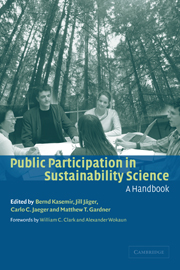Book contents
- Frontmatter
- Contents
- Notes on contributors
- Foreword: science, participation, and sustainability
- Foreword: sustainability, energy use, and public participation
- Preface
- Acknowledgments
- Part I Concepts and insights
- Introduction
- 1 Citizen participation in sustainability assessments
- 2 Contexts of citizen participation
- 3 Models as metaphors
- Part II Experiences with IA Focus Groups
- Part III Further forms of participation
- Part IV Future perspectives
- References
- Index
1 - Citizen participation in sustainability assessments
Published online by Cambridge University Press: 22 September 2009
- Frontmatter
- Contents
- Notes on contributors
- Foreword: science, participation, and sustainability
- Foreword: sustainability, energy use, and public participation
- Preface
- Acknowledgments
- Part I Concepts and insights
- Introduction
- 1 Citizen participation in sustainability assessments
- 2 Contexts of citizen participation
- 3 Models as metaphors
- Part II Experiences with IA Focus Groups
- Part III Further forms of participation
- Part IV Future perspectives
- References
- Index
Summary
The challenge
Perhaps the biggest challenge of our times is the task of achieving a transition to sustainability, a transition that will enable people around the world to live free from want and fear without compromising the ability of future generations to do so as well (Annan 2000). Research that supports such a transition can build upon first steps toward understanding nature–society interactions from two converging areas of study. The first area is work in environmental science, that has not only made substantial contributions toward our understanding of the natural world, but also has begun to include human causes and impacts of environmental change. The second area is work in economic, social, and development studies, that has started to go beyond purely societal issues and to incorporate environmental factors as well.
The emerging field of ‘sustainability science’ combines these two areas of study and uses these foundations for a better understanding of complex dynamic interactions between social, environmental, and economic issues. In order to be successful and robust, sustainability science needs to include methods and procedures for increasing public participation in its discussions and debates. In the current volume, we discuss why this is the case, and what such procedures for public participation in sustainability science could look like. We have used the issue of climate change and its relation to urban lifestyles as a case study to examine the possible roles of public participation in sustainability science.
- Type
- Chapter
- Information
- Public Participation in Sustainability ScienceA Handbook, pp. 3 - 36Publisher: Cambridge University PressPrint publication year: 2003
- 44
- Cited by

